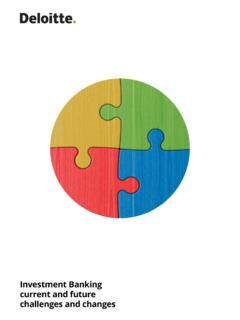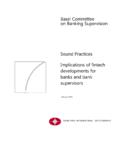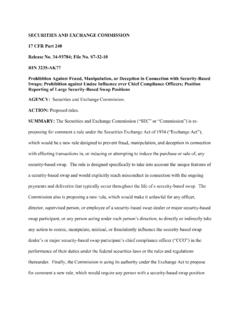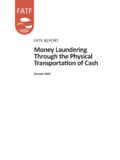Transcription of The Impact of Big Data and Artificial Intelligence (AI) in ...
1 The Impact of Big Data and Artificial Intelligence (AI) in the Insurance Sector 1 THE Impact OF BIG DATA AND Artificial Intelligence (AI) IN THE INSURANCE SECTOR OECD 2020 The Impact of Big Data and Artificial Intelligence (AI) in the Insurance Sector PUBE THE Impact OF BIG DATA AND Artificial Intelligence (AI) IN THE INSURANCE SECTOR OECD 2020 Please cite this publication as: OECD (2020), The Impact of Big Data and Artificial Intelligence (AI) in the Insurance Sector, This work is published under the responsibility of the Secretary-General of the OECD.
2 The opinions expressed and arguments employed herein do not necessarily reflect the official views of OECD member countries. This document, as well as any data and map included herein, are without prejudice to the status of or sovereignty over any territory, to the delimitation of international frontiers and boundaries and to the name of any territory, city or area. OECD 2020 3 THE Impact OF BIG DATA AND Artificial Intelligence (AI) IN THE INSURANCE SECTOR OECD 2020 Foreword Big data and Artificial Intelligence (AI) are two words that are widely used when discussing the future of business.
3 Their potential application in diverse aspects of business has caught the imagination of many, including with respect to how AI could replace humans in the workplace. Using big data and AI to customise business processes and decisions could result in outcomes better suited to individual needs and expectations while also improving efficiency. As big data and AI (also referred to as machine learning) are increasing deployed in the insurance sector, the great benefits expected are also accompanied by risks. The ability to exploit the granularity of data brings can potentially enable insights into a variety of predictable behaviours and incidents.
4 Given that insurance is based on predicting how risk is realised, access to big data has the potential to transform the entire insurance production process. This report examines both the benefits and risks big data and AI can bring to the insurance industry. In particular, it describes how the OECD Recommendation on Artificial Intelligence and the European Commission s Independent High-Level Expert Group on Artificial Intelligence s (HLAG AI) Ethics Guidelines for Trustworthy AI should be considered in the context of the insurance sector. The report then presents areas related to big data and AI in the insurance sector where policy makers may consider taking action going forward.
5 4 THE Impact OF BIG DATA AND Artificial Intelligence (AI) IN THE INSURANCE SECTOR OECD 2020 Acknowledgements The importance of insurance as a foundation for economic activity was acknowledged at the inception of the OECD with the creation of the Insurance Committee in 1961. The scope of activities of the Insurance Committee has gradually widened, and now covers the topic of private pensions, reflecting the growing importance of private pension systems in OECD countries (the Committee was accordingly renamed the Insurance and Private Pensions Committee in 2005). As digitalisation transtorms the world economy, technology and innovation in the insurance sector is has become a significant part of the work of the Committee.
6 This report on big data and AI builds on a 2017 report on the technology and innovation in the insurance sector (OECD, 2017), focusing on two of the most important developments in terms of innovation likely to Impact the insurance sector in a wide ranging manner. This report benefited from the input of OECD country contributions, including from ministries of finance, insurance supervisors, and private sector associations. It results from discussions within the Committee throughout 2019. This report was prepared by Mamiko Yokoi-Arai, a Senior Economist in the Insurance, Private Pensions and Financial Markets Division of the OECD Directorate for Financial and Enterprise Affairs.
7 It contributes to the OECD Going Digital project which provides policy makers with tools to help economies and societies prosper in an increasingly digital and data-driven world. For more information, visit 5 THE Impact OF BIG DATA AND Artificial Intelligence (AI) IN THE INSURANCE SECTOR OECD 2020 Table of contents Foreword 3 Executive Summary 6 1. Introduction 8 2. Big data 10 What constitutes big data 10 How and where insurance may be affected by big data 11 Pricing and risk classification 13 Regulatory considerations of the use of big data in insurance 14 3. Artificial Intelligence (AI) 18 What is AI and how is it being applied 18 International guidelines on AI and ethical considerations 20 Ways in which AI can/is being applied in the insurance sector 24 Considerations for policy and regulation in AI 25 4.
8 Concluding policy and regulatory considerations 27 References 29 Boxes Box 1. Telematics insurance 12 Box 2. Risk-based pricing in the New Zealand property insurance 15 Box 3. EU General Data Protection Regulation (GDPR) 16 Box 4. Work on AI in the OECD 19 Box 5. OECD Recommendation on AI 20 Box 6. Ethics Guidelines for Trustworthy AI: High-Level Expert Group on Artificial Intelligence (AI HLEG) 21 Box 7. Impact of AI on insurance business models 25 6 THE Impact OF BIG DATA AND Artificial Intelligence (AI) IN THE INSURANCE SECTOR OECD 2020 Executive Summary Big data and Artificial Intelligence (AI) are two words that are widely used when discussing the future of business.
9 The potential to applying them in diverse aspects of business has caught the imagination of many, in particular, how AI could replace humans in the workplace. Big data and AI could customise business processes and decisions better suited to individual needs and expectations, improving the efficiency of processes and decisions. While much benefits can be expected from big data and AI, there are also a number of risks that require some policy considerations. General guidance or regulation related to the use of big data and application of AI could eventually be developed by governments, and the insurance sector should be prepared to incorporate them in their specific context.
10 Big data constitutes diverse datasets, which can be anything from expanded datasets to social media data. The granularity of data has the potential to give insights into a variety of predicted behaviours and incidents. Given that insurance is based on predicting how risk is realised, having access to big data has the potential to transform the entire insurance production process. However, the granularity of data can also lead to the furthering of risk classification, where insurance premium is set based on a group of people who have similar risk profiles. The more detailed sets of data permits the fine-tuning of risk classification, which could lead to decrease of premiums for some consumers on the one hand and exclusion from insurance offerings for other consumers on the other.
















